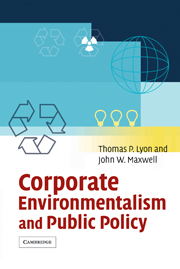Book contents
3 - Preempting future regulations
Published online by Cambridge University Press: 10 December 2009
Summary
INTRODUCTION
While some of the environmental changes now emerging in corporate America are genuine and welcome, a good many are superficial, some are downright diversionary, and a few are being specifically designed to preempt more stringent public policies from emerging.
(Brent Blackwelder, President, Friends of the Earth, quoted in Smart 1992)In an effort to head off legal restrictions on privately traded derivatives, six of Wall Street's biggest securities firms have agreed to voluntarily tighten their controls on the most hotly contested aspects of their derivatives sales and trading.
(Wall Street Journal, March 9, 1995, p. C1)In today's society any industry as conspicuous as the major home appliance industry is continually faced with the threat of government regulation. In my opinion, the only way to avoid government regulation is to move faster than the government. The alternative to government regulation is judicious self-regulation.
(Herbert Phillips, Technical Director, Association of Home Appliance Manufacturers, quoted in Hunt 1975)To economists, “regulation” means restraints imposed upon firms by government. In many cases, however, firms voluntarily restrain their own conduct; they “self-regulate.” While this book is obviously focused on corporate environmental performance, self-regulation is a much broader phenomenon. Examples from other contexts include establishment of financial exchanges, licensing of professionals, setting of safety standards, control of entertainment content, and advertising restrictions. While self-regulation may have a variety of motives, in this chapter we model it as a way to preempt the passage of new government regulations, examining the conditions under which preemption is possible and, if it occurs, its welfare consequences.
- Type
- Chapter
- Information
- Corporate Environmentalism and Public Policy , pp. 45 - 86Publisher: Cambridge University PressPrint publication year: 2004



